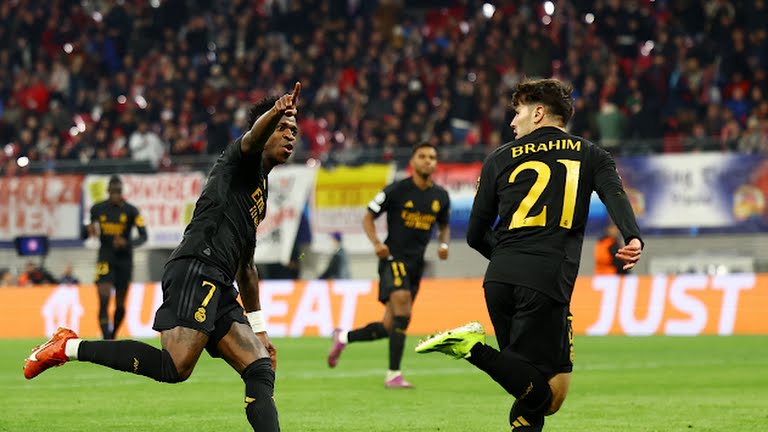Well, were you really expecting two perfect Real Madrid performances in a row? This is simply not how Madrid do things. They harness their energies, take as much pride in the ugly as the beautiful, do the next thing that is required of them. So after the evisceration of Girona came the last stand against RB Leipzig: a gruff, grizzled win in which they were forced to spend long periods defending, despite not really having many defenders to speak of.
Carlo Ancelotti called it a “collective job”, albeit one elevated by a single moment of grace. Brahim Díaz started this game as a replacement for the injured Jude Bellingham and ended it on the sidelines after sustaining an injury of his own. In between he produced the game’s only goal three minutes into the second half, a brilliant effort, and one that has given Madrid a decisive advantage going into the second leg at the Bernabéu.
Of course it helps when you have players who can manage a knockout tie as well as this, players who step up when needed. Players such as Andriy Lunin, in for Thibaut Courtois, who kept Madrid in front with two spectacular late saves and enjoyed what Ancelotti described as “his best ever game”. Players such as Toni Kroos, who was just ridiculously good again, a midfielder who was everywhere without ever seeming to run anywhere.
Beyond that, though, it was a largely even game, and if there was a note of regret for the home side it lay in those missed chances in the first half, the missed opportunities to force Madrid out of their comfort zone, to ignite their own faltering season. Had Benjamin Sesko put away one of the six chances of varying difficulty to come his way, Madrid could have few complaints. But in a way, those misses can be traced back to a chance he actually scored: perhaps the pivotal moment of the tie, coming less than two minutes in.
With Madrid regrouping after a corner, Sesko headed in Xaver Schlager’s miscued shot, only for the flag to go up. Sesko in fact was onside, but Benjamin Henrichs – who wasn’t – was judged to have interfered with Lunin, despite barely touching him. It was a soft decision, verging on gutless. “A goal that in my opinion should have counted,” according to the Leipzig coach, Marco Rose. And for a club fifth in the Bundesliga, struggling for form and lacking the simple exuberance that characterised so many of their best sides, it felt weirdly typical of their luck.
For these have been trying times at the headquarters of European football’s leading energy drink project. There has been talk of entropy, talk of crisis, talk about the ruthless Rasenball pressing machine not being what it was. Three defeats coming off the winter break had led to intense speculation over Rose’s future. And yet there was little of this frailty on show in the first half, in which Leipzig moved the ball smartly through midfield, cut Madrid open time and again, created numerous chances for the flailing Sesko.
It was only in the second half, as Leipzig chased the game, that the stress began to tell. There were still openings, still long spells of pressure, but too many poor decisions, too many hesitations. Xavi Simons started well until Madrid began to cut his supply, and the talented Loïs Openda struggled to influence the play. Aurélien Tchouaméni – a midfielder reassigned temporarily to the backline – was outstanding in this regard, his mobility and speed bailing out Madrid time and again. “I told him he played there because it was an emergency,” Ancelotti joked. “Now I have to find another excuse.”
By which point Madrid were ahead. Increasingly Díaz had been tacking towards the right flank, targeting the space behind David Raum, and now he cut inside from that side, staying on his feet despite Raum’s attempt to chop him down.










More Stories
Premier League and FA Cup semis: 10 things to look out for this weekend
Palace’s Mateta punishes Arsenal muddle to leave Liverpool one point from title
Amorim insists Fernandes not leaving Manchester United amid Madrid reports